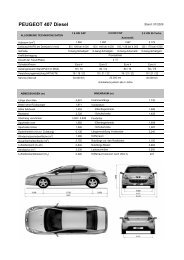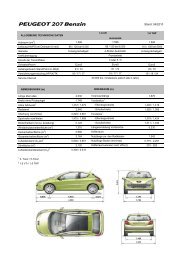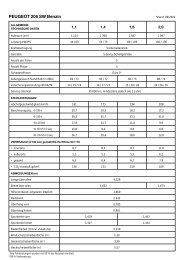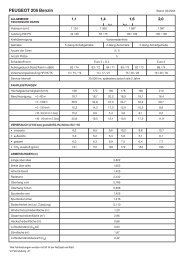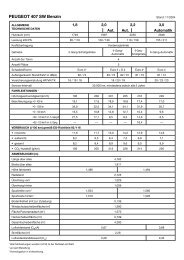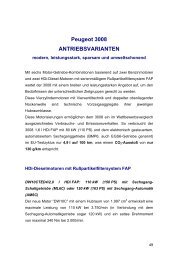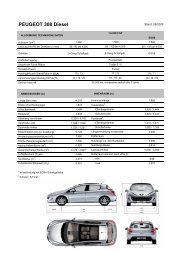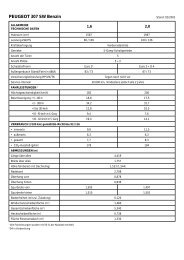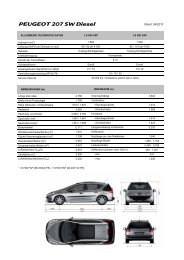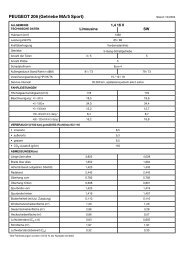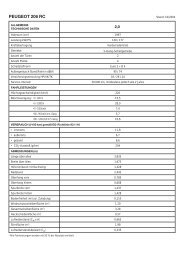PSA COUV page . page RA GB - PEUGEOT Presse
PSA COUV page . page RA GB - PEUGEOT Presse
PSA COUV page . page RA GB - PEUGEOT Presse
Create successful ePaper yourself
Turn your PDF publications into a flip-book with our unique Google optimized e-Paper software.
Human Resources<br />
MANAGING THE LABOR IMPACT OF<br />
A CHANGING BUSINESS<br />
information technology and management<br />
practices.<br />
MAINTAINING THE EMPLOYABILITY<br />
OF FEMALE STAFF AT THE RENNES<br />
PLANT<br />
At the production plant in Rennes,<br />
the development of new onboard<br />
electronics required the conversion<br />
of the wiring shops, where around<br />
85% of the workers were women.<br />
In 1999, to prepare for the changeover,<br />
plant management extensively<br />
reconfigured the workstations and<br />
set up training programs to help the<br />
workers learn new skills. By the end<br />
of 2002, more than 80% of the<br />
workers had been transferred to<br />
other jobs, such as forklift driver,<br />
automotive electrician, mechanic or<br />
shopfloor logistics manager.<br />
Transfers will continue in 2003.<br />
The Group’s commitment to<br />
retraining the wiring operators and<br />
offering them new job opportunities<br />
was reflected in two contractual<br />
arrangements. One, which covered<br />
the above programs, was a plantwide<br />
agreement on gender equality<br />
in the workplace signed with the<br />
plant’s unions on November 27,<br />
2001. The other was a gender<br />
equality contract signed on January<br />
30, 2002 by plant management and<br />
the French Ministry of Social Affairs,<br />
Labor and Solidarity.<br />
• Supporting employees in the event of<br />
job eliminations<br />
Changing technology and markets are<br />
causing the loss of jobs at a number of sites.<br />
In each case, internal placement and other<br />
support programs are implemented to identify<br />
the best solution for each employee concerned.<br />
CONTINUALLY ENHANCING SKILLS TO<br />
PREPARE FOR TOMORROW’S JOBS AND<br />
MAINTAIN EMPLOYABILITY<br />
Training is a primary tool of employee<br />
relations and human resources management.<br />
By fostering skills development, training<br />
contributes to the Group’s success, while<br />
enabling employees to fulfill their career<br />
aspirations. As such it supports their<br />
employability, prepares their career<br />
development and anticipates the Group’s<br />
future needs.<br />
Excluding Faurecia, which manages its<br />
own programs, nearly four million hours<br />
of training were provided in 2002, with a<br />
focus on new employee orientation<br />
programs, automotive production and<br />
product launch-related techniques,<br />
• Anticipating and supporting corporate<br />
change<br />
Because it provides critical support for<br />
successful project deployment, training is<br />
implemented to anticipate and facilitate<br />
changes in the Group’s organization,<br />
business, processes and socio-economic<br />
environment. Training programs are<br />
designed upstream from projects to<br />
improve organizations or systems, so that<br />
people are prepared for their implementation.<br />
Many courses are led by employees who<br />
are experts in the related subject.<br />
• Exchanging expertise across borders<br />
Deployed with the same objectives and<br />
principles in France and abroad, training<br />
programs are supported by crossfertilization<br />
of experience gained in many<br />
countries. Programs are also adapted to<br />
local requirements and expectations.<br />
• Training and integrating young people<br />
Half of all employees have been on the<br />
job less than five years, and by helping to<br />
train young people, the Group is<br />
preparing the capabilities it will need in<br />
CHINA: SHARING EXPERTISE<br />
Under a program to develop employee capabilities and raise the level of vocational education<br />
in China, Dong Feng Peugeot Citroën Automobile (DPCA) has actively participated in assessing<br />
its training needs.<br />
European instructors, all experts in their fields, trained Chinese facilitators, who then led<br />
their own courses, applying the methods they had learned. Since 2001, 457 DPCA employees<br />
have attended 70 courses led by facilitators trained by the European program in such diverse<br />
subjects as quality, sales and maintenance.<br />
In 2002, DPCA also welcomed 40 technical assistants from France, who trained 170 people<br />
over several weeks. What’s more, 130 Chinese employees have participated in training<br />
assignments in <strong>PSA</strong> Peugeot Citroën plants in France.<br />
66<br />
<strong>PSA</strong> <strong>PEUGEOT</strong> CITROËN - MANAGING BOARD REPORT




